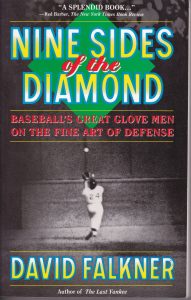Nine Sides of the Diamond: Baseballs Greatest Glove Men on the Fine Art of Defense
Book written by David Falkner
I have this memory of the local newspaper, the Youngstown Vindicator, making the great leap to include the standings for the NBA or the NHL buried among the baseball spring training box scores. This could be apocryphal, but I have little doubt that I grew up in a two sport milieu: baseball and football. We knew other sports existed. because we saw them on Wide World of Sports.
Canton, where professional football started and where the Hall of Fame is located, was just down the road. We played football in the street and in our yards, while alternating with basketball in our driveways as soon as our parents started hanging hoops.
But baseball was life from the first warm day until winter made your hands cold enough to break even inside a mitt. I was a mediocre player, but I played for a while into adulthood. As the games began to accommodate adults with varying skills, I fared better.
Like everything else in my life, no matter how small a part, I had to invest baseball with some thought. I devoured Bill James’ baseball abstracts (contemporary and historical). I perused sports pages and magazines. Really, I behaved like many semi-obsessed fans. However, I was not a fount of statistics, much to the relief of friends. I did know how many career home runs Babe Ruth hit and… yep, still do.
Not surprisingly, my interest turned to books about baseball, but they needed to be interesting in some way. I’d read juvenile biographies of favorite players as a child and didn’t want any more of that. Nor was I particularly interested in the destruction of players previously placed on pedestals. Though Jim Bouton’s Ball Four and Joe Garagiola’s Baseball Is a Funny Game both served to humanize the stars.

About the same time
that I discovered Falkner’s book, George Will came out with Men At Work. Even then, Will was a well-known face among political commentators. His take on baseball, in retrospect, was likely driven by his political views, but I liked his book. Ultimately, I learned two things from it: illuminating an interesting aspect of anything with quality prose makes for a good book and don’t discount someone just because you don’t agree about everything.Falkner followed that former dictum. While learning to play baseball, we all learned the importance of catching the ball and throwing the ball and tagging players and bases, but no one had written with quite the same verve about it. The other thing about baseball fans is this incessant need to argue- who was better? which statistics matter? Falkner’s book played right into that without the reams of data that filled abstracts and annual reviews.
I’ve written about the artistry of athletes and about artists who use older art as inspiration for new art. Falkner’s book, as well as those by Will, Bouton, and Garagiola, accomplished something similar. I mention them in order of abstraction to anecdote (and the latter does obscure the artistry the most), but turning experience and observation into prose that communicates feeling and information does illuminate our lives.
What’s it all about?
You’ve Got to Check This Out is a blog series about music, words, and all sorts of artistic matters. It started with an explanation. 103 more to go.
New additions to You’ve Got to Check This Out release regularly. Also, free humor, short works, and poetry post irregularly. Receive notifications on Facebook by friending or following Craig.
Images may be subject to copyright.
